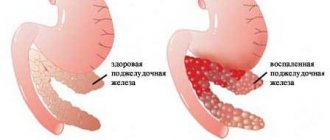Natural physiological changes as a cause
Many representatives of the fair sex encounter a situation where there is a feeling that something is twitching in the uterus long before conceiving a baby; usually this feeling is noticeable during menstruation.
If the uterus contracts strongly and sharply during the monthly cycle, the woman experiences pain. Contractions are closely related to the process of changing the hormonal levels of the body. If it is low, it is dangerous for the health of the woman and child, but increased tone can lead to very serious consequences. If the reproductive organ palpably pulsates and the uterus begins to twitch, this indicates its hypertonicity. The muscles of the uterus actively contract; the result of this activity can be a miscarriage.
The uterus is pear-shaped and consists of three layers:
- Perimetry
- Myotria
- Endometrium.
Its outer layer, the perimeter, is a membrane that protects the reproductive organ. The myotria is the second layer of the uterus and consists of muscles. The inner part of the reproductive organ is covered by a mucous membrane - the endometrium. If the uterus begins to twitch, this is an active contraction of the myotria, but it does not go unnoticed for the inner and outer layers.
During pregnancy, the uterus enlarges 500 times. Stretching its muscles is a unique process, and it is this that causes vibrations of the uterus. At this time, muscle cells - myocytes - begin to actively divide and at the same time new muscle fibers are formed, each of which will increase almost 12 times in length and 5 times in width.
When the muscle layer is not in a relaxed state, doctors diagnose increased tone of the uterus, which contracts before the time required for this process. At this time, the muscles of the uterus also react to external stimuli, the role of which is not only the work of the internal organs located next to it, but also the emotional state of the woman.
It is possible to predict situations where hypertonicity will begin in the uterus if you have complete information about the state of the woman’s hormonal system. A lack of progesterone can provoke a number of diseases and abnormalities in the functioning of the genital organs. Hyperandrogenism, genital infantilism, and hyperprolactinemia are caused by a lack of progesterone in the female body.
The term “hyperandrogenism” means that the expectant mother has an increased amount of male hormones in her body. If this state of the hormonal system began even before the child was conceived, then disruptions will be indicated by excessive oily skin, heavy body hair, and irregularities in the regularity of the menstrual cycle.
If the uterus is small, it will reflexively contract and vibrate during the growth of the fetus. In such cases, the risk of miscarriage is quite high. Hyperprolactinemia can also be detected before pregnancy, because one of its symptoms is a delay in menstruation. At this time, a small amount of milk may be released from the nipples.
This process in the female body occurs due to the increased content of prolactin, a hormone responsible for the female mammary glands and reproductive system. Progesterone is produced in small quantities, which causes contraction of the muscles of the uterus and the absence of a calm state.
Changes in the structure of the walls of the uterus can cause its increased tone. If a woman begins to have vibrations in the uterus, they will indicate the presence of a benign tumor in her tissues - fibroids. Improper growth of the inner shell can lead to vibrations. Modern diagnostic tools can detect abnormal growth of this membrane and allow doctors to take timely measures.
If a woman has a multiple pregnancy, the risk of her developing uterine hypertonicity increases. Heavy physical activity before and during pregnancy can cause uterine hypertonicity. The condition of her muscles is affected by polyhydramnios, the large size of the gestating fetus and other factors. During pregnancy, it is extremely important to prevent any infectious diseases, which are one of the main causes of increased uterine tone.
If vibrations in the uterine area are accompanied by pain and bloody or dark discharge from the vagina appears, the pregnant woman should immediately seek help from a medical facility. Even if such signs are not observed during vibrations, the woman in labor should inform the attending physician about the vibrations she feels.
During pregnancy, every woman listens carefully to what is happening inside her, so a strange pulsation in the uterine area is noticed immediately. Whether this phenomenon is dangerous or not, what to do to stop the fluctuations - the answers to these questions are of interest to many, especially if this is the first pregnancy.
You shouldn’t speculate, listen to other people’s advice, or try to take measures yourself to stop vibrations in the vagina. If any discomfort or incomprehensible phenomenon occurs inside, it is recommended to consult a gynecologist so that after an examination he can clarify the situation. After all, each pregnant woman may have her own reasons for the occurrence of rhythmic tremors.
Popular experience suggests that the uterus pulsates, as if informing that the woman is pregnant. This phenomenon is considered the first sign of the birth of a new life. Immediately after fertilization, the egg rushes to gain a foothold in the endometrium of the uterus. If the female body has accepted the fertilized egg, it is implanted into the uterine wall and the child begins to feed at the expense of the mother.
Hiccups in a child
The gestation period of about 28 weeks is characterized by the occurrence of pulsation as a result of the occurrence of hiccups in the child.
Reasons for the appearance of characteristic baby signals:
- development of the pulmonary and digestive systems;
- ingestion of amniotic fluid by a child as a result of attempts to independently control the functioning of the respiratory system and digestion of food.
A woman feels the shaking of the abdomen from hiccups only in its lower part. The process can last from several minutes to several hours. The woman should not experience any pain. However, with prolonged manifestations of pulse beating in the vagina, you need to contact a gynecologist to prevent possible oxygen starvation of the fetus. Lack of oxygen can affect the baby’s mental development and delayed physical condition.
During pregnancy over 25 weeks, a pulse may appear in the vagina due to compression of the vena cava, which runs along the spine and supplies blood to the pelvic area. A growing baby and an expanding uterus can compress the vein completely or partially. Completely blocked blood supply causes:
- a sharp increase or decrease in blood pressure;
- confusion, dizziness;
- severe vomiting and nausea.
If such symptoms appear, you should change your body position without sudden movements. If the discomfort has stopped, then there is no need to take additional measures. In late pregnancy, it is not recommended to lie on your back for long periods of time. You should rest on your side, alternating sides.
Baby moving
Some women mistake the first movements of the baby for pulsation in the vagina, since each pregnant woman puts her own meaning into the definition of her sensations. The manifestation of fluctuations at 18-20 weeks of pregnancy can be the baby’s kicks.
Pulsation is often confused with the beating of a baby’s heart if the baby is located close to the surface of the abdomen.
We suggest you read: Upper pressure high, lower normal: reasons, what to do and what to take
Blood pressure fluctuates: sometimes high, sometimes low, what to do, causes, treatment of fluctuations
When a person’s stomach throbs on the left or right side, this is a reason for consultation at a medical institution. If the symptom appears once, then there is no reason to worry. If you experience frequent throbbing pains that are accompanied by other symptoms, an urgent medical diagnosis is needed.
In the treatment of such an indicator, the patient must be provided with first aid:
- calm down;
- identify the nature and strength of manifestations;
- determine whether symptoms depend on changes in body position;
- find out the presence of other pathologies;
- Having determined the cause, you can relieve the pain if it bothers you.
If a patient is diagnosed with unpleasant discomfort due to an aortic aneurysm, treatment is performed surgically.
If a pulsating sensation appears in the abdomen due to a violation of the diet, diet, or the formation of pathologies in the gastrointestinal tract, diet therapy will play a major role. The prescription of medications will depend on the affected organ.
An important role in relieving this symptom is the normalization of the vegetative-vascular system, for which sedatives, vitamin and mineral complexes are used, and psychotherapy sessions are conducted.
If a woman’s abdomen often throbs during pregnancy, then she should definitely visit her doctor to make sure her health is normal. Most often, doctors advise expectant mothers to simply calm down, and also:
- change your posture while in a horizontal position to sitting or standing. After a certain activity, the mother’s blood circulation improves and the discomfort in the abdomen will go away;
- if the cause is a child’s hiccups, then you just need to wait it out. If the symptom manifests itself frequently and intensely, a more detailed examination should be performed;
- If bleeding and throbbing pain in the uterine area are detected, the patient needs urgent hospitalization.
Why does the uterus pulsate?
Victoria Konareva 2 years ago
It seems like my stomach has never throbbed before my period, especially since it’s still 10 days away. And here on you it’s already been throbbing for several days! and my husband and I were just ovulating in order to conceive a baby! I read a lot about this on the net and who says where. Some say it’s a sign of pregnancy, and some say it’s before your period!
more than a year ago
Only a doctor can give an accurate answer using an ultrasound scan. But it happens that the stomach begins to pull, but the expected periods are still not there. And considering that you mentioned in other posts that the test showed a cloudy second line. What else do you need? What would someone write in big letters with neon lights: You're pregnant!
Even if the stripe is not obvious, then most likely this is the second stripe. There are no girls who are “almost pregnant”, although the test may be wrong...
In general, I recommend that you retest. It is advisable to test from another company. If the result is confirmed, then you need to go to an appointment with your gynecologist. And most likely you need to prepare for the appearance of something new in your life.
the system chose this answer as the bestcommentLeather-Radish 10 months ago
If you are sure that this is throbbing and not pain, then you have a very, very high probability of being pregnant. Let's figure out why.
There shouldn't be any pain. If there is pain, this may be a signal of an ectopic pregnancy, which is usually detected no earlier than 6-8 weeks from the day of your last menstruation.
At the initial stage of pregnancy, immediately after fertilization, the egg strives to enter the uterus from the fallopian tube and attach to the wall of the uterus, implanting itself in the endometrium. In this case, naturally, the integrity of the inner lining of the uterus is disrupted, possibly even a scant discharge of a few drops of blood, which you can find on the underwear in the form of pink or brown discharge.
In this case, the fertilized egg with the embryo inside begins to feed at the expense of the mother’s body. Moreover, it does this like a parasite, growing into the wall of the uterus and attaching itself to large blood vessels. The body, if it does not reject the pregnancy, will vigorously promote the growth and feeding of the new family member.
comment
Why does a woman feel such strange beats during pregnancy? The fact is that there are several reasons for this, but to know the exact answer specifically in your case, it is best to consult your doctor. It is he who will make an accurate diagnosis, based on your medical history, or rather the course of pregnancy. Pulsation can appear at any stage of pregnancy, so the reasons are different.
Some mothers who have had more than one birth behind them can assure you that during pregnancy the fetus in the uterus hiccups. In fact, this is true, and fetal hiccups are one of the causes of pulsation. In order for a child to be able to fully live (eat, drink and breathe) after being born, he needs to make swallowing movements while still in the womb.
Hiccups can manifest themselves in different ways. During pregnancy, one woman’s entire abdomen moves rhythmically, while another feels pulsation in only one place. The third does not feel fluttering at all. The duration also varies. If the sensation lasts only a few seconds, this is considered normal, but when it pulsates for an hour or more, it is also acceptable. Naturally, hiccups do not begin from the first weeks of the fetus’s existence, but only after 28 weeks.
The fact is that the embryo begins to feed exclusively from the mother’s body, which in turn tries to give the fetus as much as possible. In this regard, blood circulation in the uterus increases, which begins to grow during pregnancy, which is why the woman feels some kind of beating.
Of course, there are also not so pleasant causes of pulsation, one of them is compression of the vena cava, which is located along the spine on the right side. This vein tends to pulsate, so if the fetus or woman is in an uncomfortable position (for the vein), then the vein can be pinched, which is why the lower abdomen pulsates. This appears after the 25th week of pregnancy.
The fetus is growing all the time, so the cause of compression of the pulsating vena cava may be pressure on the abdomen. Why does a pregnant woman sometimes faint and feel nauseous? Precisely because the fetus puts strong pressure on this vein, blocking the natural flow of venous blood. As a rule, strong pulsation begins when lying on your back, so during pregnancy you should avoid this position.
A huge percentage of women perceive the first movement of the fetus as a pulsation, although this is far from the case. During pregnancy, the mother begins to distinguish between movement and beating in the lower abdomen. All comes with experience. The sensitivity of each woman can differ significantly from each other, so if you find a point of fluctuation, do not panic. Many people simply become so sensitive during pregnancy that they are able to hear the increased blood flow of their own body.
If rhythmic movements are accompanied by pain, you should immediately go to the hospital. Perhaps some kind of disorder in the mother’s body or the development of hypoxia in the fetus. In any case, you need to tell your gynecologist about the signs to make sure that the fetus is developing normally. If necessary, the doctor will prescribe additional examination.
There is a popular belief that a sign of pregnancy is the absence of pulsation in the area below the navel. This is how our ancestors determined the status of a woman. Some people believe in this, and some don't. From a scientific point of view, such research methods are completely unfounded. Even modern tests do not give a 100% guarantee that you are pregnant. Remember, this diagnosis can only be made by a gynecologist and ultrasound.
At any stage of pregnancy, a woman can feel a pulsation in her abdomen. What causes such an incomprehensible phenomenon?
A woman begins to feel the first movements at 16-20 weeks. It all depends on individual sensitivity and the current pregnancy. A sharp increase or decrease in the number of fetal movements, and even more so their disappearance, indicates trouble. Typically, the number of fetal movements at 32 weeks reaches 90-100 movements in 12 hours, then their frequency gradually decreases and reaches 40-50 movements by the end of pregnancy.
But it turns out that pulsation in the lower abdomen is sometimes caused by completely different reasons. It is not always possible to determine what is causing the pulsation in the abdomen. Most often, according to doctors, it occurs as a result of pinching of the vena cava, as well as hiccups of the intrauterine fetus.
Complications
When a woman, after pregnancy, begins to feel pulsation in the area of the uterus, this may indicate the development of certain complications, including:
- Attachment of the fertilized egg outside the uterus, with a painful syndrome present on the right or left side of the lower abdomen;
- There is an accumulation of gases after eating low-quality, harmful or incorrect products;
- There was a protrusion of the wall of the abdominal aorta, which occurs against the background of vascular atherosclerosis;
- The tone of the uterus has increased, which in the early stages can provoke spontaneous abortion.
Pulsation in the lower abdomen during pregnancy
From the moment of registration, your gynecologist will look closely and listen to your tummy at every examination. And even more so, you will direct all your attention to him. Every pregnant woman looks forward to the rounding of her belly, evaluates its shape, size and, of course, analyzes her feelings.
Many women are alarmed by pulsation in the lower abdomen during pregnancy, which they feel at different stages. But it is impossible to say for sure what this might be. Firstly, there may be several reasons, and secondly, pregnant women call very different sensations by pulsation: what for some is tapping, moving, moving or contracting, for others it is pulsating.
Hello from baby
The vast majority of “experienced” mothers will assure you that pulsation in the lower abdomen during pregnancy is nothing more than fetal hiccups. Doctors will confirm: babies do indeed often hiccup in the womb. This occurs as a result of the baby swallowing amniotic fluid: from the 28th week, he begins to make swallowing movements in order to be able to feed and breathe independently after birth.
We suggest you read: Elevated leukocytes in the blood: what does it mean. Symptoms and causes of leukocytosis in children, women, men (reviews)
Fetal hiccups during pregnancy are accompanied by rhythmic twitching of the tummy, you feel muscle contraction. For everyone, it varies in duration - from a few seconds to an hour. In this case, as a rule, the entire abdomen shudders, although you can feel the “source” only in its lower part. Fetal hiccups often cause discomfort in the expectant mother, especially if they are repeated frequently and do not stop for a long time. And some women do not feel any hiccups at all: this is explained by a lower sensitivity threshold.
Literally from the moment a woman registers at the antenatal clinic, your gynecologist will begin to look closely and even listen to everything that is happening, or rather to your tummy, and this will happen literally at every scheduled or unscheduled examination. And even more so, you yourself will begin to direct absolutely all your attention to your stomach.
Many women are somewhat alarmed by the occurrence of pulsation in the lower abdomen, which usually occurs during pregnancy. Moreover, women can feel such pulsation at very different stages of their pregnancy. But at the same time, it’s still impossible to say anything for sure, explaining what kind of sensations these are.
And this is explained simply. Firstly, there may be several real reasons for such pulsation, and secondly, pregnant women can call truly very different and dissimilar sensations a certain pulsation. So for some, pulsation is when something taps, for others it moves or moves, and for others something contracts, and they are all convinced that this is exactly how their pulsation is.
Actually, this is why, with questions about what the pulsation you feel specifically in the lower abdomen that arose during pregnancy could actually mean, it would be best to immediately contact your specific gynecologist. We will now consider only the probable reasons for such a strange and even in some specific cases alarming manifestations of pregnancy.
Probably, the vast majority of all “experienced” mothers, having just heard about the issue of pulsation in the abdomen, will immediately assure you that such a pulsation, felt in the lower abdomen by a pregnant woman, can be nothing more than a simple hiccup of your fetus. Doctors will probably confirm this: after all, babies can actually hiccup quite often right in the mother’s womb.
And, as a rule, this happens as a result of your baby swallowing a certain amount of amniotic fluid. After all, already from the 28th week of pregnancy, the baby begins to make full-fledged swallowing movements, this is necessary so that after birth the baby will be able to feed completely independently and, of course, breathe.
And, of course, fetal hiccups during pregnancy can usually be accompanied by some rhythmic twitching of the female tummy, while the woman always feels some contraction of the abdominal muscles. For different women, such hiccups can be completely different in duration - from a few seconds to up to an hour, and sometimes more.
In this case, in women, as a rule, almost the entire abdomen can tremble, although the woman herself can feel the main “source” of such movements only in the lower part of the tummy. Hiccups in the fetus can often cause real discomfort in the expectant mother herself, especially if the hiccups are repeated frequently and do not stop for a long time.
The next and most likely cause of the sensation of pulsation in the lower abdomen that occurs during pregnancy does not look as touching as the first reason. Doctors are inclined to believe that such sensations can be transmitted by the pulsating vena cava, which runs on the right along the entire spine.
And depending on the most common position of the body of the mother and her baby, this same vena cava can sometimes be completely or partially compressed, which doctors themselves call, so rosyly, “inferior vena cava pressure syndrome.” It should be noted that such a syndrome begins to manifest itself in full approximately from the twenty-fifth week of pregnancy, although sometimes it can be even earlier.
And, as we already know, the female uterus is constantly actively growing throughout pregnancy, naturally increasing both in weight and in size. The baby also keeps up with her, and together they are able to exert a certain pressure directly on the lower abdomen. In addition, in this case, the same inferior vena cava, usually through which normal transportation of venous blood should occur, may well be infringed.
And, of course, with such pressure, the woman will feel a certain pulsation right in the lower abdomen, but with strong or complete compression, the woman may even feel severe dizziness, nausea, and sometimes even lose consciousness. It should be recalled that special pressure on this vena cava occurs precisely when the expectant mother lies constantly on her back, which is why many doctors urge pregnant women to abandon such a position for their sleep or rest, and this must be done from the beginning of the second trimester of pregnancy.
As we said earlier, the very word pulsation in the understanding of different women can vary radically, and pulsation for different women may not always mean the same pleasant or not so pleasant sensations. There are mothers who claim that it was with these pulsating sensations that they were able to hear their little baby for the first time.
Thus, it is absolutely possible that in your particular case, some pulsation felt in the lower abdomen during pregnancy may turn out to be simple first movements of the fetus. However, of course, a lot will depend on exactly what stage of pregnancy you are at now.
Let us immediately note that the vast majority of pregnant women are able to perfectly distinguish the movement of the baby, from the child’s hiccups and, of course, from the pulsation of the veins and simply similar sensations from each other. And many women claim that some pulsation felt in the lower abdomen specifically in their case is certainly not some kind of baby hiccups.
And even if you really don’t know why you feel a certain pulsation in your stomach, definitely don’t make any unnecessary guesses. Most often, such pulsation cannot pose absolutely any danger or threat. By the way, it may turn out that your body is so sensitive that you feel the movement of blood itself through the vessels (you must agree, the total volumes of blood constantly moving through them really increase greatly during this difficult time for the body).
We invite you to read: Stages of hypertension: degrees and risks, approaches to treatment
And, nevertheless, this issue also has several small “buts”. Try to always avoid even slight compression of the inferior vena cava (just don’t go to sleep on your back). And if the baby’s hiccups (well, of course, in your opinion, hiccups) are repeated too often and for some reason do not stop for too long, and even more so in cases where the intensity or duration of such hiccups changes from time to time are increasing, then you will definitely need to undergo some additional examinations.
This is necessary, first of all, in order to completely eliminate the possible development of fetal hypoxia (this is a condition when the baby experiences an acute lack of oxygen). And remember any of your fears or simple doubts can only be dispelled by a qualified doctor. Definitely do not be shy and, if you doubt your feelings, visit him earlier than the time for a scheduled examination, especially if something really worries you.
Symptoms
The clinical picture of pulsation in the abdomen does not have clear indicators, since this symptom manifests itself in various diseases that have characteristic symptoms.
The most common pathological cause of the disease is aortic aneurysm. To recognize the disease in time, doctors pay attention to the following complaints:
- constant attacks of pain;
- heaviness in the stomach;
- pale skin tone;
- significant tingling;
- impaired sensitivity.
Abdominal aortic aneurysm
If throbbing pain in the lower abdomen on the left, right or center appears in a person for a short time and without additional symptoms, then there is nothing to worry about. If the condition worsens, other manifestations of illness occur, and prolonged throbbing in the abdomen, you should seek medical help.
Pinching of the vena cava
Abdominal twitching caused by pinching of the vena cava can occur after the 25th week of pregnancy, when the baby gains weight and begins to put pressure on the lower uterus. This leads to pinching of the vena cava, which transports venous blood, and causes a sensation of its pulsation. In order to prevent vein pulsation, starting from 20-25 weeks of pregnancy, it is preferable to sleep on your side.
In the supine position, the child presses the vena cava with its weight and this can provoke inferior vena cava syndrome. This syndrome develops in every tenth woman during pregnancy and causes shortness of breath, palpitations, nausea, a drop in blood pressure and darkening of the eyes to the point of fainting, and can also lead to impaired renal function in the woman and hypoxia in the fetus.
Hypoxia in the fetus is currently the leading cause of perinatal morbidity. Neuropsychiatric diseases in 80% of newborns are associated with intrauterine hypoxia. Changes in the brain may decrease after birth and then increase again. Inferior vena cava syndrome is a preplacental cause, and its treatment consists of eliminating actions that lead to compression and disruption of blood flow.
Other diseases
Uterine pain may indicate infections of the reproductive organs or diseases of other organs. The uterus can hurt for the following reasons:
- cervical cancer;
- erosion;
- ectopia;
- leukopenia;
- underdevelopment of the genital organs;
- adhesive process;
- ectropion;
- fibroids, polyp, fibroma, adenomyosis;
- hormonal problems, for example, androgyny, underdevelopment of the genitals;
- long-term wearing of an intrauterine device;
- cyst formation.
Symptoms of pain may indicate uterine prolapse or prolapse, hyperandrogenism, hyperprolactinemia. This sign may indicate the presence of cholecystitis, appendicitis, colitis, parasitic infection, or spinal pathology. Don't ignore the symptoms. If the uterus shoots, aches, the bladder hurts, and at the same time there is a feeling of fullness, nausea, vomiting - immediately make an appointment with a doctor. The gynecologist will conduct diagnostics, provide the necessary assistance, and prescribe medications.
Hiccups
After 28 weeks of pregnancy, the baby begins to make breathing movements and swallows a small amount of amniotic fluid. This causes the baby to have prolonged bouts of hiccups, which in the middle of pregnancy do not cause concern to the mother, but in the last weeks of pregnancy can cause discomfort in the uterus and are traditionally a cause for concern about the health of the child.
The doctor may prescribe an examination using ultrasound, echocardiography, or Doppler echocardiography. These are harmless and highly informative methods for determining the condition of the fetus.
The woman will also be assessed for the condition of the fetal vessels. Visualization of the great vessels of the fetus is possible from 16-18 weeks of pregnancy, but accurate identification and measurement are possible from 20 weeks.
In rare cases, a woman may feel a pulsation in early pregnancy. They say that the reason for this is improved blood circulation, designed to provide the nascent embryo with everything it needs. According to the medical version, this condition is associated with implantation of the embryo, which lasts from 6-9 days to 7 weeks of intrauterine development.
Another reason for pulsation in the uterus is a woman wearing very tight clothing, which compresses the blood vessels and prevents normal blood circulation. Therefore, women should not use old, tight clothes with narrow elastic bands during this period. And it’s better to rest half-sitting in a chair, placing a pillow under the lumbar area. In this position, the pregnant uterus does not compress the vena cava and neighboring organs.
In general, a woman has many reasons for concern during pregnancy, and pulsation is the most harmless of them. Doctors at the antenatal clinic advise at this time to get plenty of rest, eat rationally and avoid stress and empty worries. Let the wait for the baby be calm and joyful for the woman.
Pulsation in the uterus during pregnancy can also occur at a later stage. However, even in this case, you should not always worry about the health of the developing fetus, but if you experience discomfort or pain, it is still recommended to go for an unscheduled visit to a leading gynecologist.
Many girls say that they feel a pulsation at 28 weeks of pregnancy. The appearance of such a symptom is often associated with the occurrence of hiccups in a child. This condition is not dangerous, and only indicates that the formation of the pulmonary and digestive systems is currently not yet completed.
Also, hiccups can occur as a result of the fact that the child swallows amniotic fluid, as he attempts to independently control the functioning of the respiratory and digestive organs. In this case, the pulsation will be localized exclusively in the lower abdomen.
The duration of the process varies and can take from several minutes to several hours. It is very important to pay attention to painful sensations. If they are present, then this is an alarming symptom and you need to urgently visit a doctor. When the hiccups persist, you also need to undergo an examination, because it is possible that fetal hypoxia develops, and this, in turn, can cause a delay in its development.
Conception
If you believe the general opinion, then the occurrence of such a condition as pulsation in the uterine cavity encourages the girl to take a pregnancy test so that she finds out about her situation as early as possible. That is, the reproductive organ in this way reports or sends a signal in the early stages that conception has occurred.
Pulsation in the uterus in the early stages indicates conception. Source: mirpolzy.ru
After contact between the sperm and the egg occurs, the latter tries to attach as quickly and firmly as possible to the uterine wall on the endometrial layer. If this process is successful and the fertilized egg is securely fixed, then a gradual process of its development will begin.
As a result of this, transformations begin to occur in the reproductive system, directly related to changes in the structure of the circulatory system, since the vessels begin to actively transport biological fluid so that the fetus receives the necessary nutrients and oxygen. When the uterus begins to increase in size, the woman will periodically feel a pulsation.
What to do if you feel pulsation
It is quite difficult to prevent pulsation during pregnancy, but you can improve your condition and that of your child by taking simple prevention methods:
- take walks at least 30 minutes a day;
- diversify your diet with foods containing proteins, vitamins, fats, carbohydrates, and fiber in sufficient quantities;
- ventilate the bedroom by doing daily wet cleaning;
- do breathing exercises for at least 15 minutes daily.
If pulsation in the vagina causes pain, you should immediately consult a gynecologist. If bloody discharge appears simultaneously with an increase in body temperature or pain in the lower abdomen, you must call an ambulance.
During pregnancy, self-medication is dangerous for the woman and child. Therefore, you should tell your doctor about any unpleasant or painful sensations. Having made a diagnosis, the doctor will determine the cause of the discomfort and prescribe the correct treatment that is gentle for the child.
The occurrence of a sensation of pulsation in the vagina, associated with pain, may have the following reasons:
- ectopic pregnancy - pain radiates to the right or left side of the lower abdomen;
- accumulation of gases in the intestines caused by improper selection of foods;
- aneurysm of the abdominal aorta, resulting from the development of atherosclerosis of the vascular system;
- excessive tension in the muscles of the uterus, which can cause miscarriage.
Vaginal pulsation is a fairly common phenomenon during pregnancy. Women who have given birth more than once do not consult a doctor about this, knowing that these fluctuations do not cause any specific danger.
If pain occurs, accompanied by pulsation in the vagina, you should consult a doctor without waiting until the pregnancy is terminated.
Tags: uterus, mean, pulsation
About the author: admin4ik
« Previous entry
Etiology
There can be many reasons for the appearance of pulsation in the abdomen. The most common ones are related to:
- disruption of the gastrointestinal tract;
- diseases of the abdominal aorta;
- influence of the menstrual cycle;
- maybe during pregnancy.
In men and women, this symptom is often diagnosed as a result of improper bowel function. Ripple can be formed on the basis of dysbiosis, poisoning or overeating.
With the development of pathology, such a sign indicates the progression of the aortic aneurysm. However, if the pulsation appeared only a few times, then most likely the cause was external factors.
Pathological causes of pulsating sensations can be not only an aortic aneurysm, but also other ailments:
- tumors;
- narrowing of the abdominal aorta;
- pancreatitis;
- liver diseases;
- impaired functionality of the heart muscle.
Pancreatitis is a possible cause of pulsation in the abdomen
Most diseases develop on a nervous basis. Frequent mood swings provoke increased motor skills and pulsation in the navel area.
Pulsation in the right lower abdomen can also occur in women and young girls during menstruation. Doctors consider this a normal natural process in which a representative of the fairer sex feels pain and discomfort.
Unpleasant feelings overcome a woman during menstruation due to contraction of the uterus. At the beginning of the menstrual cycle, the endometrium is shed in the female body; in order to finally get rid of the contents, the uterus has to shrink. This is why women experience pain so often.
However, it is worth understanding that painful attacks should not be severe and not disturb the general condition and health of the woman. If pulsations and pain are intense, this may indicate uterine hypertonicity, which is a dangerous condition.
When is it time to see a doctor?
Uterine pulsations can result in serious complications, so you need to be alert and seek medical help in time. Here are situations where pulsations can cause serious problems:
- Vibration of the abdomen appears along with a strong intermittent nagging pain that lasts more than 20 minutes and radiates to the lumbar region. This is a sign that contractions have begun. If the birth is still far away, you need to urgently go to the doctor, otherwise a miscarriage is possible.
- You should also seek medical help if pulsations appear along with pain and spasms and last more than 15-20 minutes. If this is not done, fetal hypoxia may occur.
- You cannot do without medical help even when pain appears when lying on your side.
- pulsation during the menstrual period is normal. However, if it is accompanied by severe bleeding and pain, it would not hurt to consult a doctor.
There are many reasons why the uterus pulsates. But most often the stomach “beats the rhythm” in women expecting a baby. This symptom is one of the early signs of the birth of a new life. It is not dangerous either for the unborn baby or for his mother, and therefore should not cause any special worries or worries.
As soon as a woman finds out that she is pregnant, she certainly turns all her attention to the sensations inside herself. And of course, the woman feels a certain pulsation in the lower abdomen. This scares many people, and they look forward to visiting the gynecologist. Each person perceives pulsation in their own way. Some believe that these are contractions, others that they are knocking, and still others even consider them to be moving.
Pain in the vagina
Vaginal pain is a pathological unpleasant physical sensation in the vaginal area. The characteristics of pain in the vagina are very diverse and depend not only on the cause of its occurrence, but also on the individual characteristics of the body - the personal “pain threshold” and the interpretation of the sensation of pain.
The vagina and surrounding areas contain many nerve endings (receptors) that perform a very important function - they respond to external or internal influences of a physiological or pathological nature. All information received from these endings is received and analyzed in the brain, where it forms an adequate “response” to any signals coming from the receptors.
Vaginal pain is not always associated with gynecological or obstetric problems. The vagina is in close connection with surrounding organs and tissues - the urinary tract, rectum, and spine. Unpleasant sensations or pain in the vaginal area can sometimes appear due to problems in adjacent organs and tissues. Such pain is called “radiating”.
The intensity of pain is in a wide range; the patient may be practically undisturbed by aching pain in the vagina of a permanent or short-term nature, and sometimes paroxysmal severe pain in the vagina forces her to immediately seek help. Particular attention should be paid to sudden severe pain in the vagina due to fever, symptoms of infection or bleeding.
Pain in the vagina of inflammatory origin is almost always combined with other signs of inflammation - leucorrhoea, bleeding, itching and/or burning sensations, difficulty urinating, and so on.
Vaginal pain in children may be associated with genital malformations or trauma. During the period of decline of hormonal function
Source
Topographically, the fallopian (uterine) tube, the ureter, extending from the left kidney and opening into the bladder and sigmoid colon, are projected into the left side of the abdomen of the female body. Therefore, the cause of pain in the lower left abdomen in women, as a rule, is damage to one of these organs.
What to do if you have pain in the lower left abdomen?
In order to find out which organ of the female body provoked the occurrence of painful sensations in the lower left quadrant, the pain syndrome should be detailed. This concept means an assessment of the severity and nature of pain (cramping, cutting, stabbing, pulling, etc.), as well as its relationship with body position, physical activity, urination and the act of defecation.
Further, during a medical interview, they determine the presence of other symptoms (fever, the presence and nature of vaginal discharge, diarrhea, etc.), and also find out whether similar painful attacks have happened before, and, if so, what they were were called.










